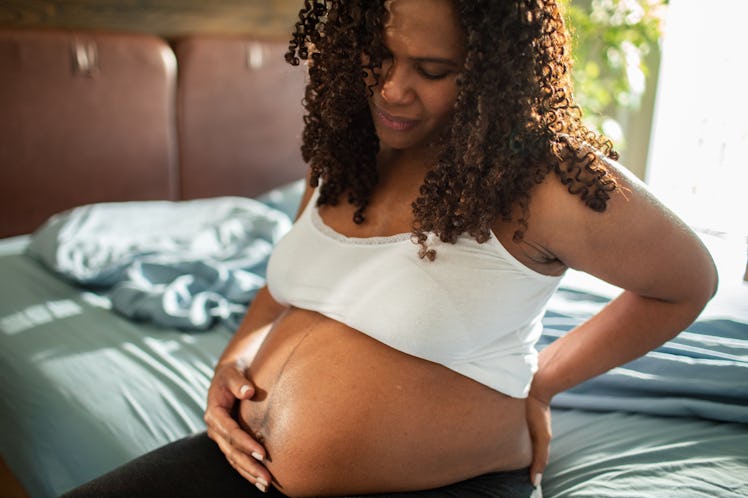Why Pregnancy Farts Are Healthy, According To Doctors
Pregnancy farts are nothing to worry about. After all, she's farting for two.

Scientists with unusual research priorities have demonstrated that couples who fart together tend to stay together. That’s good. What’s better for expecting parents is that pregnancy farts are real — and no, you can’t blame the baby kicking. Along with weird cravings, constipation, and a few suitcases’ worth of prenatal vitamins, pregnant people get gas. Thanks to hormonal and physiological changes, they wind up farting, burping, and bloating for two. Let us reassure you that gas during pregnancy is common, healthy, and nothing to be ashamed of. Let it rip.
The average person farts up to 20 times a day, passing anywhere from 500 to 1,500 milliliters of gas. But for pregnant people, this number inflates because their bodies produce more progesterone. Progesterone causes the intestine muscles to relax to make room for a growing baby, says Dr. Michael Cackovic, an obstetrician-gynecologist at Ohio State University. These relaxed muscles also make it much easier for pregnancy farts to slip out.
As the fetus grows, it puts extra pressure on the abdomen. This contributes to pregnant people not just farting more, but farting more in inopportune places such as at work, with the in-laws, or during an exam from an obstetrician. A bun in the oven also makes it harder to push waste through the GI tract, slowing digestion. Prenatal vitamins contribute to constipation, creating a perfect gas storm. Bloating, burping, and farting inevitably follow.
“Pregnant women often complain of abdominal bloating and constipation likely caused by hormonal changes that affect small bowel and colonic motility,” Cackovic says. “Additionally, the pregnant uterus can cause a mechanical slowing of bowel transit, and this certainly could worsen as pregnancy advances into the third trimester.”
Pregnant people’s diets can further contribute to excessive pregnancy farts. But it’s not necessarily strange cravings for pickles and ice cream that do it. Rather, healthy dietary changes brought on by having a baby, such as eating more fruits and vegetables, can increase gas — especially if the pregnant person wasn’t paying much attention to their diet prior to getting knocked up.
Are Pregnancy Farts Unhealthy?
Pregnancy gas is not, in and of itself, a bad thing. But during pregnancy, a build-up of gas can become harmful. If pregnant people are experiencing abdominal pain or constipation for more than a week, they should contact their doctors. Otherwise, excessive gas-passing is nothing to worry about and poses no danger to a growing baby.
That said, moms-to-be can reduce some of their pregnancy gas pains or discomforts by drinking plenty of water, getting enough exercise and sleep, and limiting dairy, pork, and processed foods, which can worsen flatulence.
As powerful and plentiful as pregnancy farts are, they’re ultimately a sign that the pregnancy is progressing in a healthy way. They should be welcomed with open arms and plugged noses.
Small adjustments might offer relief, but nothing helps more than having a supportive partner farting by their side, Cackovic says. “Reassurance over the temporary inconvenience and support are the keys to getting through this.”
This article was originally published on